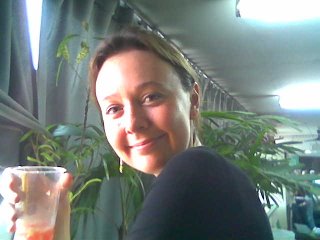Tales of an Australian Bacoleno

I am an Australian lass living in Bacolod City, which is on Negros Island, one of the 7,100 islands comprising the amazing Philippines. I have been here for seven months, and in that time have only met one other Australian who lives in this city. She’s another Youth Ambassador for Development who arrived a few weeks ago.
Never heard of Bacolod? Well, it’s not the largest city in the Philippines, but nevertheless it is slightly difficult to be lonely here. With an official population of 429,076 in the year 2000, Bacolod is approximately twice the size of Australia’s capital city, Canberra. It’s also about 40 degrees warmer here in the summertime.
Bacolod is the capital city of Negros Occidental, a province in the western part of Negros Island, which is in the Visayas (the middle bit of the Philippines). The middle bit of the Philippines is often overlooked in world events. Without the glamour of Manila, or the unrest in Mindanao, the Visayas carry on their business without putting on too much of a song and dance, suffering continual power shortages and appalling traffic conditions with a “well at least we don’t live in that hole of a national capital”, happy-go-lucky, entirely charming “let’s eat more chicken and talk about the teevee in the dark” kinda attitude.
While Bacolod has been almost entirely reforested with eucalyptus trees, Australia does not figure much in the perceptions that locals have of the world. I am often asked what part of the states I am from. Usually, after telling people that I am from Australia, I will then be asked whether Australia is on the east coast or the west coast, and whether it’s very close to New York.
Those who know Australia are instant friends. Unfortunately, many seem to have had their hearts broken by Australians. More than once I’ve seen a local touch their chest, sigh and echo “Australia”, with a mysterious wistfulness. Then they’ll write a name on a piece of paper and instruct me to tell so-and-so that they’re still waiting here. The strangest experience I ever had was at an airport counter where a clerk had to wipe a tear from his eye upon seeing my passport.
“Oh,” he sighed delicately, “you’re from Australia.”
In truth, most days I feel as if I am from a parallel universe. Many things are the same: the smell of eucalypts, the sunshine, the beach and most of the time, the language. I say “most of the time” because the last can be misleading. Having been a wordy person all my life, I have noticed that the use of English here is really quite strange. I often find myself thinking I am on common ground in conversation when in actual fact our understandings are worlds apart. It tends to be disorienting and even nauseating to a mild degree.
The confusion arises when locals mix the local dialect, called Ilonggo, with a liberal dash of English, so it sounds like any old idiot Anglophone should be able to fathom it. This hybrid mixture is then blurted out in a jumble of sighs, melodies and sing-song whoopsadies that is actually quite soothing when dropped on the ears at full throttle. In actual fact, Ilonggo English (or Ilongglish, as I like to call it), is a false friend to Anglophones everywhere.
I have had to learn Ilonggo, since it is spoken in the office in which I work. All my friends here speak it also, along with Tagalog which is the national tongue. It has been a complicated process, only made more difficult by the fact that no one was able to give me formal lessons. The general consensus was that I would pick it up just by hearing it spoken over and over again. Sometimes, my Filipino migs would try to speak slower and louder for their Ilonggo-second-language friend, with confusing gestures and smatterings of English thrown in for good measure. Invariably they would soon tire of this and lapse into a form imbued with short-cuts, leaving me to squeak at the end:
“English palihog. Indi ko ka intiyende.” (English please. I can’t understand you.)
To complicate the matter, Ilonggo dictionaries are not readily available. There was one on the internet a little while back, but it seems to have disappeared. I have a print-out from a previous Australian who was here, but it is rat-nibbled, coffee stained and invariably wrong. The dictionary also goes one-way only: English to Ilonggo. If you want to actually work out what someone is saying to you, it’s next to useless.
Another complication has been that no one will write anything down for me, since Ilonggo is not so much a written as a spoken language. When I have managed to get something on paper from a helpful local, somebody else will tell me it’s wrong. It also seems that regardless of what I say, no one will ever actually believe that a westerner is trying to speak Ilongglish anyway. Most westerners here are American tourists who don’t stay long enough to learn the local dialect. As a result, I am often laughed at, even though my Ilongglish is technically correct.


0 Comments:
Post a Comment
<< Home